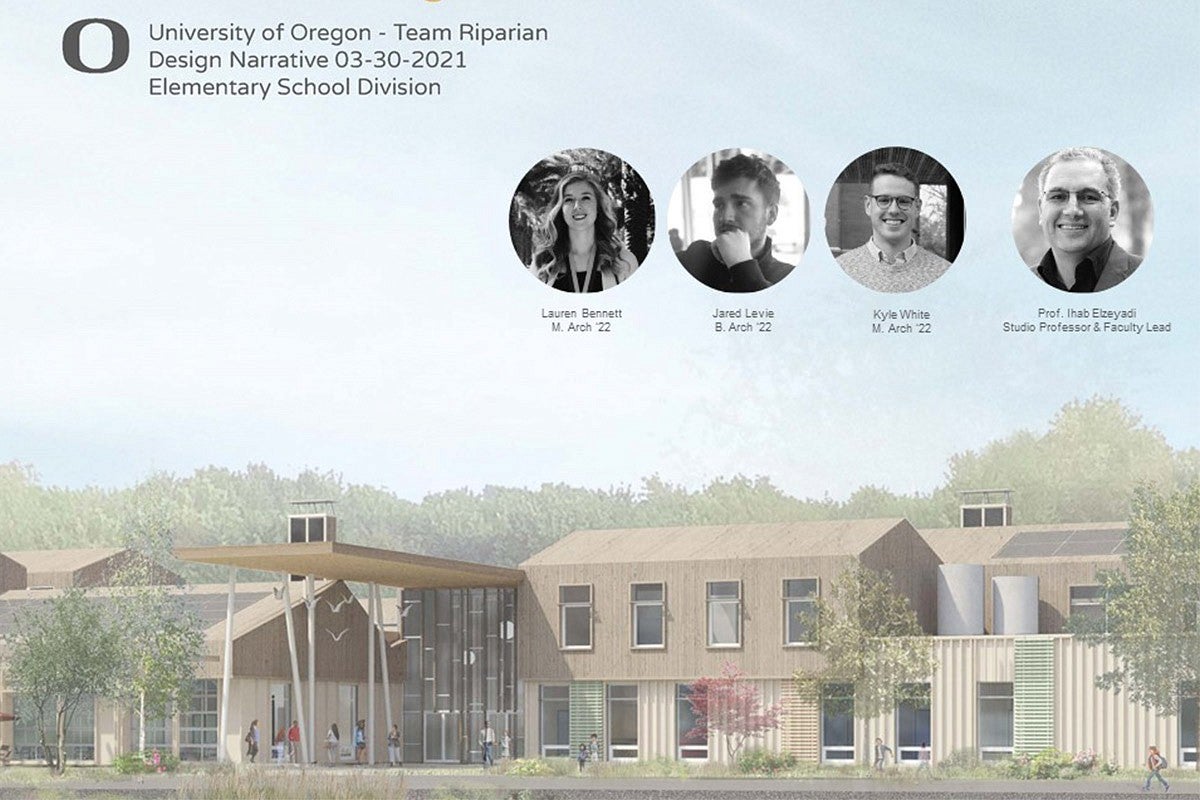
In a historic win, a team of UO architecture students, led by Architecture Professor Ihab Elzeyadi, has won two international 2021 Solar Decathlon Design Competition awards: the First-Place Gold Trophy in the Elementary School Division and the Grand Jury Award across all divisions of the competition.
U.S. Secretary of Energy Jennifer Granholm presented the award to Elzeyadi and students Lauren Bennett (MArch, class of 2022), Kyle White (MArch, class of 2022), and Jared Levie (BArch, class of 2022) at the virtual ceremony on April 18.
“Today’s decathletes are tomorrow’s architects and engineers who are going to help us achieve President Biden’s ambitious and achievable clean energy goals and build our Net-Zero future,” Granholm said at the award ceremony. “I can’t wait to see their big ideas come to life in neighborhoods across the country and around the world.”

The U.S. Department of Energy’s Solar Decathlon Design Competition recognizes projects that emphasize low-carbon, low-energy, and excellence in sustainable design.
“This is a monumental achievement and the first time in the competition’s 20-year history to have an architectural team sweeping both awards two years in a row,” said Elzeyadi. His studio team, Team Polaris, also won both awards in 2020. Elzeyadi also instructed and mentored the 2021 Team Riparian in “High Performance Environments,” a studio that he has taught every winter term since 2007. The studio is unique in that it provides this learning and competition opportunity to a large group of students, not a select few, and will continue to do so in the future.
“Each year, the High Performance Environments studio targets a different environmental and social challenge. The Department of Architecture made a Black Lives Matter pledge in June 2020 to respond to social, racial, and spatial injustices facing many U.S. cities. Part of my pledge is to devote the effort of my studio to improving conditions of marginalized and under-represented neighborhoods through the power of sustainable design and Net-Zero architecture.”
“This is a monumental achievement and the first time in the competition’s 20-year history to have an architectural team sweeping both awards two years in a row"
—Professor of Architecture Ihab Elzeyadi
The studio focused on the challenge of how architecture can provide hope and opportunity to Portland’s historically Black Albina neighborhood, specifically through a redesign for Dr. Martin Luther King Jr. Elementary to transform it into a Net-Zero school by combining social, economic, and environmental sustainability strategies.
Team Riparian rose as finalists in the internal design competition and integrated Net-Zero architecture with the elementary school’s Montessori curriculum to provide life-long learning lessons of sustainability where architecture can act as a hands-on textbook. Their design not only proposes a new Net-Energy positive design that consumes 90 percent less water than a typical school, Elzeyadi explained, but it also provided a space for the community, “a resilient place to gather, garden, and learn sustainable Net-Zero living. This was done with an accessible and neighborhood-friendly building that integrated passive and active energy-conscious architecture.”

The team competed against teams from 89 schools of architecture and engineering from around the world with only 72 advancing to the finalist stage.
“It was an amazingly hard journey, and we all learned a lot from it,” said Elzeyadi, pointing to the difficulties of teaching the studio online during a pandemic, as well as directing the modelling and simulation in his High Performance Environments lab (HiPE) virtually. “We are pleased to bring two more Solar Decathlon trophies to the School of Architecture & Environment and the College of Design.”
“The School of Architecture & Environment faculty and students have been leaders in the field of sustainability and environmental design for decades and this recognition highlights the great vision, talents, and capacities of our programs,” said Michael Zaretsky, the head of the department of architecture. “We are extremely proud of the work of Professor Elzeyadi and the student team. We look forward to seeing more UO submissions to the Solar Decathlon competition in the years to come.”
“In the face of serious global challenges, there is no more important work than to develop aggressive, creative innovators who can connect the power of design with good science and rigorous ethical thinking,” added Erin Moore, director of the School of Architecture & Environment. “This recognition is an important national spotlight on the importance of design education for the real-world application of leading-edge science and cultural thought.”
Read more about the 2021 competition and winners in the Department of Energy’s announcement, “Secretary Granholm Announces Winners of Solar Decathlon Design and Build Challenges.”
See the Decathlon presentation by Team Riparian here.
